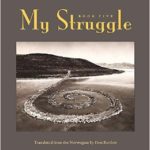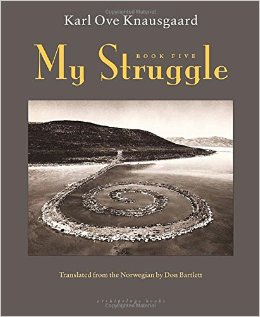A Stroll through the Knausgaard: A Review of My Struggle, Vol. 5

I wanted to write, that was all I wanted, and I couldn’t understand those who didn’t, how they could be happy with an ordinary job, whatever it was, whether teacher, camera operator, bureaucrat, academic, farmer, TV host, journalist, designer, publicist, fisherman, truck driver, gardener, nurse, or astronomer. How could that be enough? I understood it was the norm, most people had ordinary jobs, some put all their energy into them, others didn’t, but to me it seemed pointless. If I were to take such a job my life would feel meaningless however good I was at it and however high I rose. It would never be enough.
What was this feeling?
I didn’t know. It was beyond imagination, beyond explanation or justification, there was no rationality in it at all, yet it was self-evident, all-eclipsing: anything other than writing was meaningless for me. Nothing else would be enough, would quench my thirst.
But thirst for what?
How could it be so strong? Writing a few words on paper? And, yes, that wasn’t a dissertation, research, a report, or that sort of thing, but literary?
It was madness, for this was precisely what I couldn’t do. I was good at academic assignments, and I was good at articles, reviews, and interviews. But as soon as I sat down to write literature, which was the only way I wanted to spend my life, the sole occupation I perceived as meaningful enough, then I fell short. —Karl Ove Knausgaard
For years as I struggled to write decent stories and finish a novel, I lived day-to-day feeling much the same as Knausgaard. In that time of my life I did more dreaming and wishing than writing, unfortunately. And discarding what writing I did manage.
 For this reason and many others, Norway’s Karl Ove Knausgaard and his multivolume, autobiographical “novel” cheekily entitled My Struggle (Min Kamp) has resonated with me throughout its long publication schedule on this side of the Atlantic (the final volume won’t be out here until 2017). It seems that growing up suburban and middle class in Norway in the 80s wasn’t much different from doing so in the surburban American South about that same time, at least from the astounding number of parallels I’ve found in Knausgaard’s text with my own life.
For this reason and many others, Norway’s Karl Ove Knausgaard and his multivolume, autobiographical “novel” cheekily entitled My Struggle (Min Kamp) has resonated with me throughout its long publication schedule on this side of the Atlantic (the final volume won’t be out here until 2017). It seems that growing up suburban and middle class in Norway in the 80s wasn’t much different from doing so in the surburban American South about that same time, at least from the astounding number of parallels I’ve found in Knausgaard’s text with my own life.
Now, some of that’s nothing to boast about—I’m talking a rather self-absorbed journey for this young scribe, meaning myself as well as Knausgaard’s character in the narrative. From his interest in pop music to binge drinking to self doubt, from lassitude to arrogance to difficulty relating either to women or simply the rest of humanity at large, the path of my youth and young adulthood came embedded with many of these same foibles and growing pains, like stony, hurtful obstacles easy enough to avoid, if only one has the awareness of where to step.
To this end, charting Knausgaard’s emotional growth as a human being is often the most thrilling aspect of this essentially non-narrative in terms of specific plot mechanisms. Other than reaching various milestones—it’s the complete story of a life, but only lived up to a certain point, of course—the My Struggle series propels us ahead on the sheer pleasure and delight that invariably, often in compellingly readable blocks of text built upon innumerable details and nuances in descriptions of both narrator interiority as well as environment, lead to the key turning points in this writer’s life.

That he is a writer, one more possessed with the desire for wish fulfillment than talent or drive or commitment in the years depicted in Book Five, resonates most with this reviewer. His yearning to write “literary” material, and weighing whether he should waste time reviewing or writing articles and other projects for which he has experience, suffering self-doubt and feelings of worthlessness in every piece of fiction completed (or not), every would-be scribe worth his salt indeed struggles through some variation on this theme. Or they probably ought to, if on the quest to write meaningful fiction that has something to say about the human experience.
Does all this make My Struggle a novel series best suited for other writers? Perhaps. And, again, a middle-aged white male novelist having shared many similar dramas and heartbreaks as Karl Ove means that the books, originally submitted as a 3,600 page manuscript, read not simply as compelling or impressive, seem at times to have been, eerily enough, written just for me.
But isn’t that how many of us feel, when a good book hits us “just right?” I suspect so.
While it’s obviously not the case that he had me in mind, or anyone besides himself—I haven’t encountered many works outside of Proust as exhaustively personal as this—there’s nothing like a piece of art hitting the sweet spot in this manner; and in a literary sense, no book I’ve read in the last few years has struck me in the solar plexus quite like My Struggle. Highest recommendation.
About dmac
James D. McCallister is a South Carolina author of novels, short stories, journalism, creative nonfiction and poetry. His neo-Southern Gothic novel series DIXIANA was released in 2019.